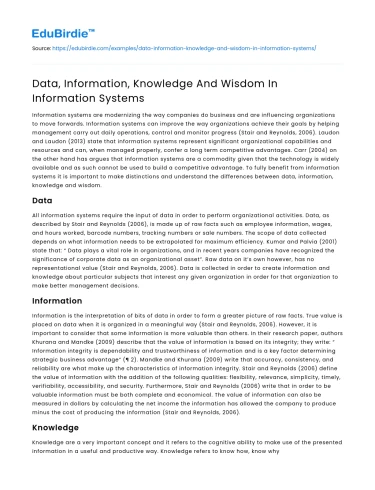Information systems are modernizing the way companies do business and are influencing organizations to move forwards. Information systems can improve the way organizations achieve their goals by helping management carry out daily operations, control and monitor progress (Stair and Reynolds, 2006). Laudon and Laudon (2013) state that information systems represent significant organizational capabilities and resources and can, when managed properly, confer a long term competitive advantages. Carr (2004) on the other hand has argues that information systems are a commodity given that the technology is widely available and as such cannot be used to build a competitive advantage. To fully benefit from information systems it is important to make distinctions and understand the differences between data, information, knowledge and wisdom.
Data
All information systems require the input of data in order to perform organizational activities. Data, as described by Stair and Reynolds (2006), is made up of raw facts such as employee information, wages, and hours worked, barcode numbers, tracking numbers or sale numbers. The scope of data collected depends on what information needs to be extrapolated for maximum efficiency. Kumar and Palvia (2001) state that: “ Data plays a vital role in organizations, and in recent years companies have recognized the significance of corporate data as an organizational asset”. Raw data on it’s own however, has no representational value (Stair and Reynolds, 2006). Data is collected in order to create information and knowledge about particular subjects that interest any given organization in order for that organization to make better management decisions.
Save your time!
We can take care of your essay
- Proper editing and formatting
- Free revision, title page, and bibliography
- Flexible prices and money-back guarantee
Information
Information is the interpretation of bits of data in order to form a greater picture of raw facts. True value is placed on data when it is organized in a meaningful way (Stair and Reynolds, 2006). However, it is important to consider that some information is more valuable than others. In their research paper, authors Khurana and Mandke (2009) describe that the value of information is based on its integrity; they write: “ Information integrity is dependability and trustworthiness of information and is a key factor determining strategic business advantage” (¶ 2). Mandke and Khurana (2009) write that accuracy, consistency, and reliability are what make up the characteristics of information integrity. Stair and Reynolds (2006) define the value of information with the addition of the following qualities: flexibility, relevance, simplicity, timely, verifiability, accessibility, and security. Furthermore, Stair and Reynolds (2006) write that in order to be valuable information must be both complete and economical. The value of information can also be measured in dollars by calculating the net income the information has allowed the company to produce minus the cost of producing the information (Stair and Reynolds, 2006).
Knowledge
Knowledge are a very important concept and it refers to the cognitive ability to make use of the presented information in a useful and productive way. Knowledge refers to know how, know why and know when of experts acquired through extensive training and many years of experience. It is an ability to think deeply about the information and recognize appropriate ways in which it can be used. As such, it is possible for two individuals to have access to the same store of information but to use them with very different results. (Fraser 2016).
Wisdom
The concept of wisom as it pertains to information systems refers to the ethical development and use of these systems. As we will see in our studies, information systems have become very powerful over the last two decades and the ability to collect, process and store information on customers, employees, suppliers and other third parties is truly enormous. Used imprperly or carelessly, information systems can cause significant societal harm. As such, it is important that systems developers and managers use ethical principles such as Kant’s Categorical Imperative or Descartes’ Rule of Change when thinking about information systems capabilities and uses.
Example
Data, information and knowledge are best described when placed in a context. For example, a particular company might be interested in increasing their sale numbers. This company would then collect data on such things as their customer’s preference, their customers purchasing habits, the number of sales they have achieved in the last month, or the time and day of sales. The company would then process this data to turn it into information that could be presented to marketing analysts for their review. The analysts, through their years of experience and knowledge of the industry and business will be able to take this information and gain insights as to the best way of increasing sales. The analysts, managers and expectative must use wisdom to ensure that any course of action under consideration will not harm customers or employees in the quest for growth.
Conclusion
The ability of the organization to characteristics and differences between data, information and knowledge is an important factor to taking full advantage of an information system. Simply put data is a collection of raw facts that is converted into information with the use of knowledge.






 Stuck on your essay?
Stuck on your essay?

